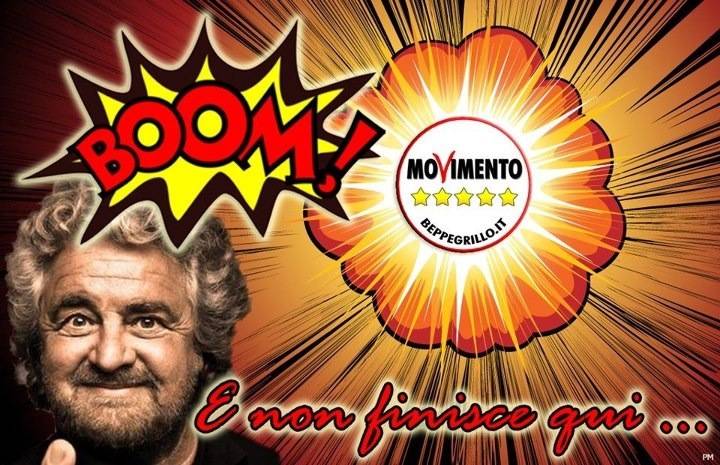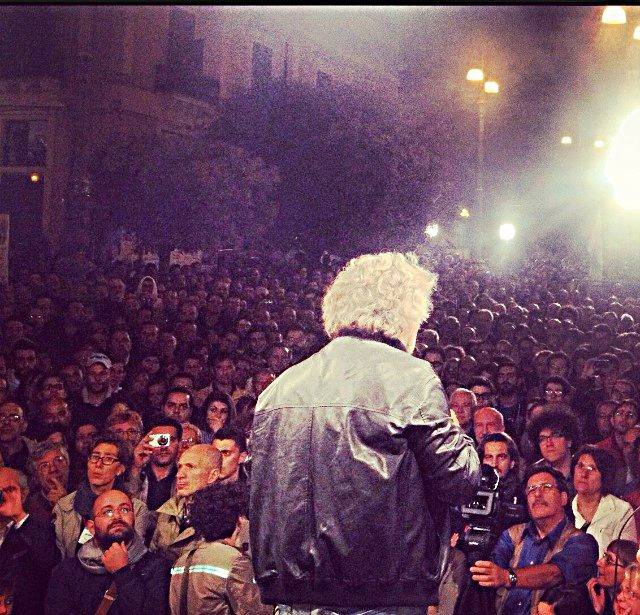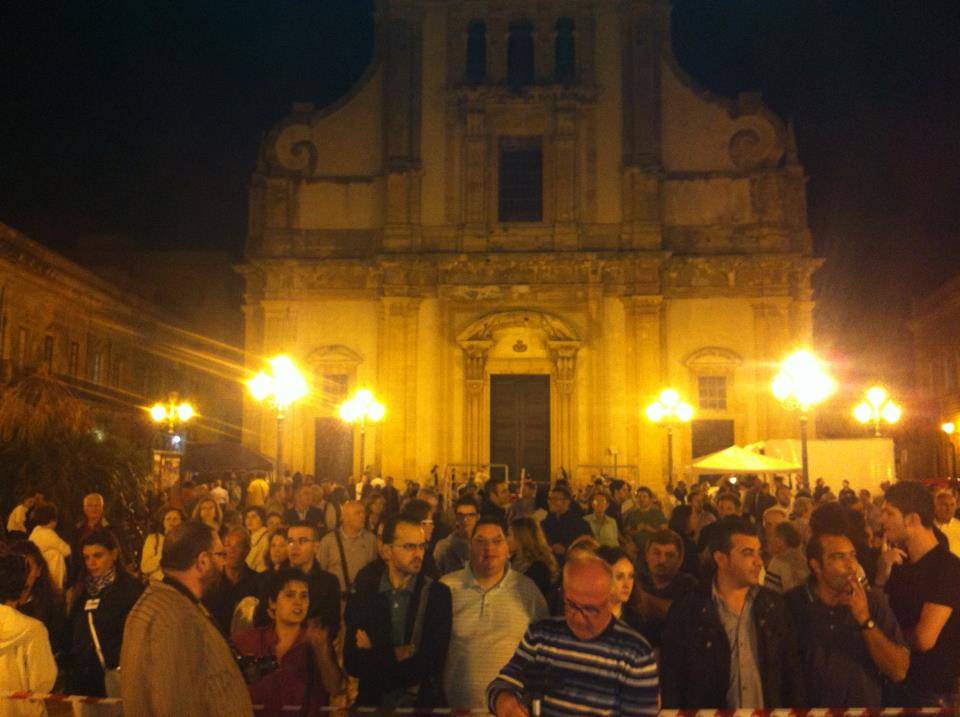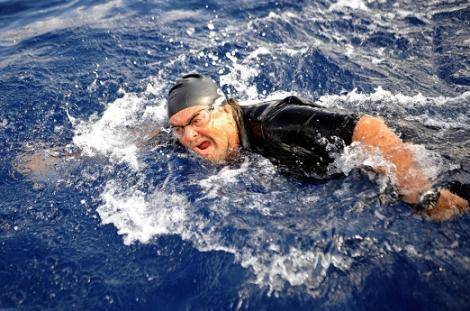Grillo's Sicilian Splash-Down
ROME - When Beppe Grillo (see his blog >>>) emerged from the waves on a Sicilian beach after swimming from the Italian mainland across the 1.86 treacherous miles of the Straits of Messina, Italian pundits jokingly compared his feat with a famous long-distance swim by Mao Tse-Tung. Grillo's exploit Oct. 10 was the official launch of his party, Movimento Cinque Stelle (M5S), into the Sicilian regional election fray. In the event, Grillo had the last laugh, for when the Oct. 28 ballot boxes were opened, they showed that M5S has bounced up from zero to 14.7%, to become the single largest party in Sicily, well ahead of such rivals as Pier Luigi Bersani's Partito Democratico (PD) on the left and Silvio Berlusconi's Partito della Liberta' (PdL) on the right.
With 13.5% of the vote, Bersani's PD slipped slightly but significantly below Grillo's. The PdL fared far worse, slumping to a mere 12%, almost one-third of the 34% Berlusconi's party commanded in the last regional election, held in 2008. As predicted, however, the real majority party was composed of the skeptics and the disaffected who simply stayed home, in a region where an election turn-out of 80% and more was not unusual in the past. A bellwether of warning to Rome is that this week's turnout of 2,203,885 voters, out of a population of 5.1 million, meant that less than half (47.42%) of Sicilians entitled to vote bothered to do so.
The count for the individual candidates who campaigned for the presidency of the regional assembly, which meets in Palermo's historic Palazzo dei Normani, was slightly different. Here Rosario Crocetta of the PD, with the backing of the Pier Ferdinando Casini's Unione dei Democratici Cristiani e di Centro (UDC), swam away with the presidency, with a total vote of 30.5%. In case anyone missed the significance of this on the national level, Italian TV viewers were, as a result, treated to endless footage of Bersani and Casini grinning and hugging each other; together, they had, through their victorious candidate Rosario Crocetta, managed to trump the candidate of the shaggy-haired, politically scary Beppe Grillo. "With my election," Crocetta told the media, "I really believe that the history of this country is being changed. A rubber wall has been broken down. For the first time a center-left candidate who has run on fundamental values like the fight against the Mafia has won.... There's new and clean air here."
Even here, however, Grillo's people may have the last laugh, or at least a giggle, for the question now is what comes next. Crocetta is personally interesting and highly regarded. He began his working life as a chemist in the oil-refinery Southern Sicilian town of Gela. He is openly gay, he speaks four languages, he bag political life with the Communist party and later with the Greens and he has published a book of poetry. He survived a Mafia murder attempt in 2003, and ever since has been in real danger for his attacks on the Mafia. As regional president, his coalition of moderate Catholics and leftists represents less than one-third of the electorate, meaning that he lacks the majority needed to run the region and to pass legislation. Crocetta and company will therefore require a governing partner, and the most suitable is obviously the Grillo candidate, Giancarlo Cancelleri, who walked away with 18% of the vote for regional president.
But the Grillo crowd are in no hurry to join any government. "Go ahead, seduce us," Cancelleri taunted Crocetta. "Tame us." But then he added that matrimony with Crocetta's bi-party coalition was out of the question: "We're old maids, old shrews," he specified, sending reporters to their editions of Shakespeare so they could flesh out their post-election pieces with long quotes about taming shrews. "Anyway, Crocetta needs others for allies, and he can find some besides ourselves," he added mischievously, knowing very well which shrew Crocetta would prefer to tame. Cancelleri, who says that the Grillo party in Sicily will support Crocetta only on individual issues, case by case, is equally interesting. Because a M5S goal is to reduce the cost of politics in Italy, Cancelleri promises that his party's neophyte regional assemblymen will renounce three-quarters of their monthly stipend, making do with around $3,000. The savings will be devoted to launching small business enterprises in Sicily, he said.
The other possible ally for the Bersani-Casini alliance, Sicilian version, is theoretically Gianfranco Micciche', 58, leader of a locally based Sicilian party, Grande Sud. Born in Palermo, Micciche' became a manager with Berlusconi's publicity company Publitalia '80 and, transferring to Forza Italia, served as Berlusconi's Minister for Development. Micciche' made headlines when he commented that, if one had to wait for the defeat of Mafia bosses before public works contracts were awarded, "then we would never get moving." He also reportedly objected to renaming the Palermo airport to honor the Mafia victims Judges Giovanni Falcone and Paolo Borsellino because it would give those arriving a poor impression of Sicily. His personal party, Grande Sud, occupies a centrist position in the Sicilian firmament and accounts for some 15% of the island's votes. "He could guarantee stability for Crocetta, but at what price?" asks the conservative daily Libero.
Unfortunately for anyone considering Micchiche' as a possible ally for Crocetta, he is considered close to Raffaele Lombardo, the disgraced former regional president, as well as to Berlusconi. This October's election of a new regional assembly was caused by Mafia scandals that precipitated Lombardo's resignation under a dark cloud. He had replaced Salvatore Cuffaro, who is now serving a seven-year prison term for Mafia association. The Sicilian election is therefore of more than usual interest, with reports in the media from the Guardian in London and the Wall Street Journal in New York and to China's CRIEnglish.com.









































i-Italy
Facebook
Google+
This work may not be reproduced, in whole or in part, without prior written permission.
Questo lavoro non può essere riprodotto, in tutto o in parte, senza permesso scritto.